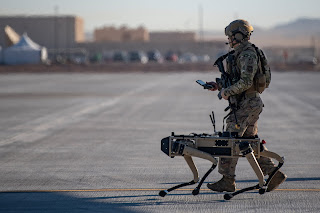The Implications of The Growing Use of Autonomous Weapons and Artificial Intelligence in Modern Warfare
The Implications of The Growing Use of Autonomous Weapons and Artificial Intelligence in Modern Warfare
The utilization of autonomous weapons and artificial intelligence (AI) in modern warfare is reshaping the landscape of military operations and strategic considerations. With advancements in technology, nations are increasingly incorporating autonomous systems and AI algorithms into their defense strategies. However, this evolution raises significant implications that extend beyond the battlefield. In this article, we delve into the multifaceted implications of the growing use of autonomous weapons and AI in modern warfare.
Introduction
Autonomous weapons, also known as lethal autonomous weapons systems (LAWS), refer to military systems capable of selecting and engaging targets without human intervention. These systems leverage AI algorithms to analyze data, identify threats, and execute actions autonomously. The integration of AI in warfare encompasses various applications, from unmanned aerial vehicles (UAVs) to robotic ground units, revolutionizing traditional modes of combat.
Advantages of Autonomous Weapons and AI in Modern Warfare
Enhanced Precision and Accuracy
One of the primary advantages of autonomous weapons is their ability to achieve unparalleled precision and accuracy in targeting. By leveraging advanced sensors and real-time data analysis, these systems can discern between combatants and non-combatants with high fidelity, minimizing collateral damage and civilian casualties.
Improved Decision-Making Capabilities
AI algorithms embedded within autonomous weapons enable rapid decision-making in dynamic and unpredictable environments. These systems can assess situational factors, anticipate enemy movements, and adapt their tactics accordingly, providing military forces with a strategic advantage on the battlefield.
Reduced Human Casualties
The deployment of autonomous weapons can potentially reduce the risk to human soldiers by assuming tasks deemed too dangerous or high-risk. From reconnaissance missions to frontline engagements, these systems can operate in hazardous environments with minimal risk to human personnel, thereby safeguarding the lives of military personnel.
Ethical Concerns Surrounding Autonomous Weapons and AI
Lack of Human Control and Accountability
One of the foremost ethical concerns associated with autonomous weapons is the relinquishment of human control over the decision to use lethal force. Unlike traditional weapons systems operated by human operators, autonomous weapons possess the autonomy to initiate lethal actions without direct human oversight, raising questions of accountability and responsibility in cases of misuse or malfunction.
Potential for Misuse and Unintended Consequences
The proliferation of autonomous weapons introduces the risk of misuse and unintended consequences, including the escalation of conflicts and unintended civilian harm. Without adequate safeguards and regulatory mechanisms, these systems could be susceptible to manipulation or exploitation by malicious actors, exacerbating global security threats and destabilizing regions.
Violation of International Laws and Norms
The deployment of autonomous weapons raises significant legal and ethical questions concerning adherence to international humanitarian law (IHL) and the principles of proportionality and distinction. The indiscriminate use of lethal force by autonomous systems may contravene established norms governing armed conflict, leading to potential violations of human rights and humanitarian standards.
Impact on International Relations
Shifts in Power Dynamics Among Nations
The adoption of autonomous weapons and AI capabilities in warfare could reshape global power dynamics by affording technological advantages to certain nations. States possessing advanced autonomous warfare capabilities may exert greater influence in geopolitical affairs, potentially fueling competition and strategic rivalries among nations.
Potential for Arms Race Escalation
The proliferation of autonomous weapons systems could instigate an arms race scenario characterized by the rapid development and acquisition of AI-driven military technologies. This escalation could heighten tensions between states, increase the likelihood of conflict escalation, and undermine efforts towards disarmament and arms control.
Influence on Diplomacy and Negotiations
The integration of autonomous weapons into military arsenals necessitates diplomatic engagement and multilateral cooperation to address shared concerns and mitigate risks. Diplomatic efforts aimed at establishing norms, confidence-building measures, and arms control agreements are essential to fostering stability and preventing the unchecked proliferation of autonomous warfare technologies.
Security and Strategic Considerations
Vulnerability to Hacking and Cyber Attacks
Autonomous weapons systems are susceptible to cybersecurity threats, including hacking, spoofing, and data manipulation. Malicious actors could exploit vulnerabilities in AI algorithms or communication networks to compromise the integrity and functionality of these systems, posing significant security risks to military operations and infrastructure.
Need for Robust Cybersecurity Measures
Ensuring the cybersecurity resilience of autonomous weapons requires the implementation of robust encryption protocols, intrusion detection systems, and secure communication channels. Additionally, ongoing monitoring and vulnerability assessments are essential to identifying and mitigating emerging cyber threats to autonomous warfare capabilities.
Ensuring Responsible Deployment and Usage
Military forces must adhere to ethical and legal frameworks governing the development, deployment, and use of autonomous weapons. Establishing guidelines for the ethical use of AI in warfare, including principles of transparency, accountability, and proportionality, is paramount to mitigating risks and upholding international norms and standards.
Humanitarian and Moral Implications
Protection of Civilian Populations
The deployment of autonomous weapons raises concerns about the protection of civilian populations and adherence to principles of distinction and proportionality in armed conflict. Safeguarding civilian lives and minimizing harm should remain paramount considerations in the development and utilization of autonomous warfare technologies.
Ethical Considerations in Targeting and Warfare Tactics
The ethical implications of autonomous weapons extend to the targeting process and military tactics employed in warfare. Ensuring the ethical conduct of military operations requires careful consideration of the potential consequences of autonomous actions on civilian populations, cultural heritage sites, and essential infrastructure

.jpeg)

.jpeg)


.jpg)

Comments
Post a Comment